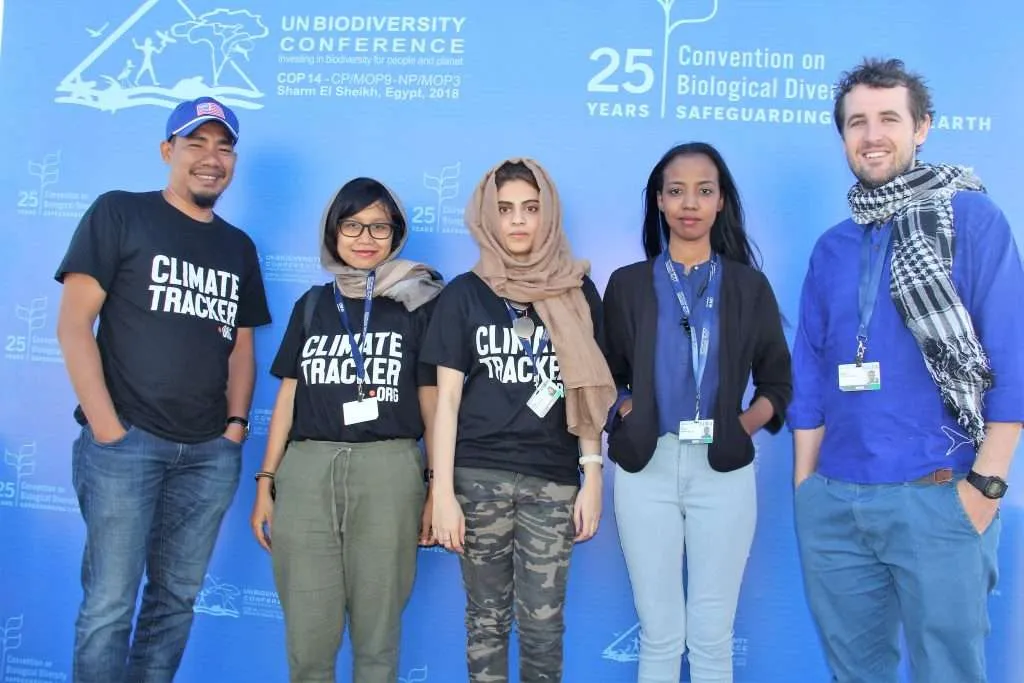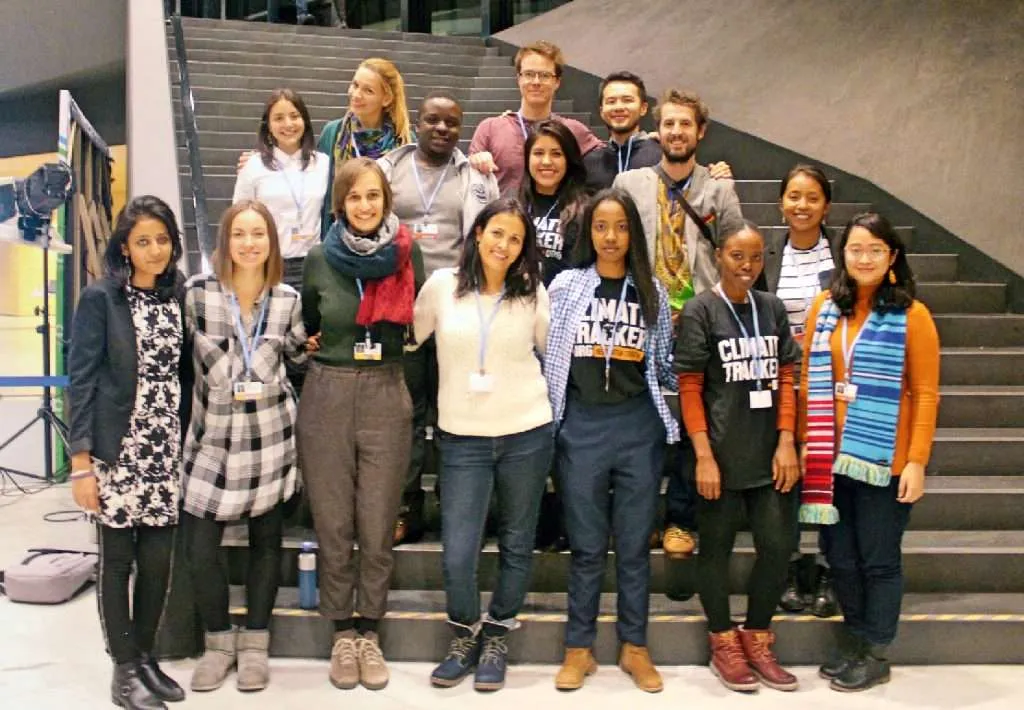Dear Climate Tracker family,
Today I am excited to announce a new chapter in our organizational future.
When I decided to leave my first job in the International climate space to create Climate Tracker, I really wasn’t sure if it would work at all.
I knew there was a problem I wanted to solve, and how I wanted to approach it. I knew that for too many young journalists around the world, there simply wasn’t the support, training and opportunities they needed to tell the world’s most important story. That was the void I hoped Climate Tracker could fill.
That was back in 2015.

Before the Paris Agreement, and well before most of the world’s newsrooms had come to fully realize just how critical this story was, or what their journalists needed to tell that story.
Sadly, many still haven’t.
What I knew is that I couldn’t wait for the major news hubs and Universities to catch on, and even if they did, their opportunities would be exclusive to a select few genius grants, strategic interests or scholarships.
What I wanted to do instead was create opportunities right away for young journalists to cover not only the world’s most important climate negotiations, but the most important climate challenges in their own countries.
I didn’t want to limit this to strategically important countries, or the most impactful wire services, or a set language club. I wanted this to be open to anyone up for the challenge, and always open to new applicants. I wanted to combine open trainings with individualised mentoring experiences and incentivised challenges that any journalist around the world could strive for.
Today, I still can’t quite believe just how many journalists have taken up this challenge.

Over the last decade, we’ve seen more than 40,000 journalists apply for our programs around the world, and published over 10,000 climate stories in leading newspapers around the world.
We’ve had journalists featured on front pages from dozens of countries, from South Africa to Sudan, Madagascar to Medellin, Chile to Costa Rica, India, Indonesia and the Philippines.
We’ve had journalists lead prime time broadcasts from Argentina, Bangladesh, Trinidad & Tobago, Jamaica, Mexico and many more. And we’ve sent over 200 Negotiator Trackers to the world’s biggest climate events.

We now have fostered the largest network of climate journalists in Latin America, the Caribbean and Southeast Asia, and our network across Africa and the Middle East remains incredibly strong.
But in the end, the thing that I’m most proud of, is the space we’ve created for young journalists to grow.
Whether it was a regional journalist who joined one of our programs, only to end up as a nationally distributed author, or a senior writer who broke into one of the few Climate reporting roles in their country, the best moments of this last decade have always been when we have been able to support other journalists on their own journeys.
That is why today, I’m proud to announce the next steps in Climate Tracker’s journey.
Over the last 2 years, our organization has undergone a significant transition process, empowering our regional hubs to lead and implement journalism programs that better respond to regional challenges and needs.
Throughout this process, there have certainly been challenges, but we’ve also seen an incredible diversity of programs and stories emerge that I never would have thought possible before.
This is a journey of de-centralisation that not only reflects our commitment to a more agile and responsive structure, but also recognizes the importance of diving deeper into regional and national climate stories.
This is a journey I’m excited to support going forward, but no longer out in front.
That’s why Climate Tracker is announcing a brand new leadership team that will be taking our global work forward.
For many of you in the Climate Tracker family, you might already know who I’m talking about.
For the last few years, Climate Tracker’s work in Asia, Latin America and the Caribbean has been spearheaded by three incredible Regional Directors.



Going forward, Biena, Francisco and Dizzanne will not only lead their Regional hubs, but also make up the new Leadership team Climate Tracker’s International work.
Over the last 2 years, our Regional Hubs have transformed into separate registered entities in their own right, and they’ve all seen incredible growth in the process.
This gives me absolute confidence that following this growth is the right approach for Climate Tracker’s future, and that a decentralized, global leadership team will be the best possible fit for the future Climate Tracker wants to create.
Through this transition, we aim to strengthen our global network while simultaneously nurturing the autonomy, agility and innovation of our regional entities.
We also hope this new structure will promote greater collaboration and knowledge-sharing across our regions, and believe that this transition will enable us to meet the evolving needs of our programs and globally diverse journalists around the world.
As always, we will remain committed to delivering the best possible support, training and opportunities for young climate journalists around the world, and I will also remain involved as a special advisor, supporting our global leadership team, to ensure a smooth transition and provide ongoing support and guidance.
Now, incase you haven’t met them before, I’d like to introduce our new International Leadership team:
Biena Magbitang
Our Asia regional director is an award-winning journalist from the Philippines with over a decade of experience as a Producer on the biggest English language news broadcast in the country. She always dreamed about being able to empower journalists across Asia to tell the climate story, and under their leadership, Climate Tracker Asia has established itself as the biggest climate journalism network in Southeast Asia, run dozens of impactful training programs and developed innovative collaborations between editors and journalists across the biggest newsrooms in Asia.
Francisco Parra
Our Latin America Regional Director has been reporting on climate change for several years now, for both Chilean and international media outlets. Since joining Climate Tracker, he has not only led the establishment of Climate Tracker Latam, but grown the Latin American team to over 9 staff and a regional network of journalists spread across 18 Latin American countries.
Dizzanne Billy
Our Caribbean regional director was one of our first Climate Tracker fellows, way back in 2015 and has been with the organisation ever since the beginning. She always wanted to see us expand in the Caribbean, and over the last three years, has led an incredible expansion of our programs in the region. In the next few months, she will also be leading a newly registered Climate Tracker entity in Trinidad & Tobago, and I’m incredibly excited to see just how far our Caribbean work can go.
Through their industry knowledge, organizational experience and global insights, I’m confident that they will be able to lead Climate Tracker on a journey of global collaboration, local impact, and deep contextual understandings as we continue to support journalists and the world.
Sincerely,

Founder and now Global Advisor, Climate Tracker
Just in case you had any more questions:
Why is the organizational transition happening?
This transition is part of our ongoing efforts to become a more agile and responsive organization. Empowering our regional directors will enable us to make decisions that better support journalists in their local contexts.
Will there be any changes to the trainings and opportunities offered?
We remain committed to supporting climate journals and the world, regardless of where they are from. We will also continue to offer programs, training and support across Africa and the Middle East as key climate stories will always cross-cut global barriers. While there may be more opportunities within our regional hubs in the short term, this will always be a focus of our work going forward.
Who should I contact if I have questions or concerns about the transition?
If you have any questions or concerns, please do not hesitate to reach out to either Dizzanne, Biena or Francisco, and feel free to loop me in.
How will the transition impact existing programmes or agreements?
Existing contracts or agreements will not be impacted by the organizational transition. We will continue to honor all existing fellowships, programs and opportunities and will work closely with our partners to ensure a seamless transition.
Will there be any changes to the organization's registration and "head office"?
Climate Tracker has always been and always will be a remote first, globally flexible network. The organisation was originally registered in Australia, and has since established independent entities registered in the Philippines and Chile, as well as an additional entity soon to be registered in Trinidad and Tobago.
As part of the transition, future partnerships may be housed in one of these separate registered entities, but will continue to run globally dynamic programs connecting journalists and climate challenges around the world.
How will the transition affect the organization's financial performance?
We do not anticipate any significant impact on our financial performance as a result of the transition. In fact, we believe that empowering our regional directors will enable us to be more nimble, cutting back on globally centralised costs and excessive transaction fees.
Will there be any changes to the organization's mission or values?
Our mission and values will remain unchanged. We are committed to supporting journalists around the world to cover climate issues in their own context, and developing training, research and opportunities that enable them to dive into these stories like never before.
How will the organization ensure a smooth transition for employees and stakeholders?
We are committed to ensuring a smooth transition for all our partners, team members and Climate Tracker family. I will be providing ongoing support and guidance to our new international leadership team, and we will be communicating regularly with our global team and partners to keep them informed and address any concerns.